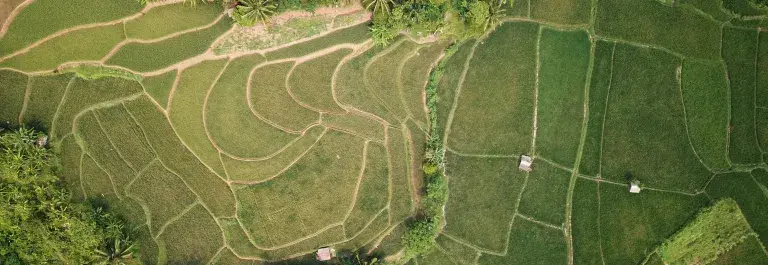For companies to make a real difference on climate change, they will need to address scope 3 emissions that are embedded in their supply chains. To do this, they need to implement strategies in their direct supply chains, using tools such as sustainability standards and certification, and look at how they can contribute to wider landscape-level outcomes and impacts.
Engaging in jurisdictional or landscape-level approaches should allow companies to drive impacts at scale. ISEAL’s upcoming guiding practices for companies will help them to support and invest in these initiatives as well as manage their claims.
Within climate finance for REDD+ (the UN framework to curb climate change by stopping the destruction of forests) the development of jurisdictional strategies has been a key part of national government action.
What is new is how companies, primarily multinationals with large sourcing footprints, are also looking at jurisdictional or landscape programmes as a way to reach their commitments on climate action. Many of these companies have set net-zero targets (following Science-Based Targets (SBTI)) and are looking at these types of interventions to provide scalable impacts and mitigate risks related to various ESG issues.
Defining credibility in an emerging space: ISEAL’s good practices
How exactly companies can support and incentivize the low-emission development strategies of the jurisdictions and regions they are sourcing from is still being explored. However, what is clear is that these new ‘beyond supply chain’ strategies will require good quality and reliable data from the jurisdictional side, and adequate and transparent actions from the company side. Without this, it will become impossible to unpack the market claims and progress reporting that we will see in the future. Jeopardizing the credibility of the whole undertaking.
In 2020, ISEAL published the ‘Making Credible Jurisdictional Claims’ good practice guide. This provides concepts and practices for jurisdictional initiatives and the companies that source from them to develop robust, transparent and impartial means to monitor, verify and communicate progress.
Testing practices in Brazil and Indonesia
Over the course of 2021, we tested these practices with a number of jurisdictional initiatives that are driving change on the ground.
In Brazil, ISEAL worked with PCI (Produzir, Conservar, Incluir), Instituto Centro Vida, and Kultiva to explore how jurisdictional progress is being made in the Amazon and Cerrado state of Mato Grosso. PCI is widely regarded as one of the leading jurisdictional initiatives, and their efforts at subnational level to tackle deforestation have become even more important in the current national environment.
Together with its local partners and support from international actors, PCI successfully set out jurisdiction wide goals and developed various governance elements and structural outcomes reflected in ISEAL’s guidance.
By unpacking the ISEAL guidance, PCI was able to identify areas of improvement that will strengthen the effectiveness of their efforts going forward. One of these areas relates to company action and sourcing from Mato Grosso, and how these are contributing to PCI’s goals and targets. Knowing this will enable PCI to guide corporate engagement towards the actions with the highest potential to contribute to the PCI targets. PCI also identified the need for connecting companies and investors with producers and projects on the ground. To solve this problem, PCI will launch a public platform containing various projects with the potential of finance and support for scalability and impact. PCI and its partners will continue to work with ISEAL in 2022 to take these practices forward.
In Indonesia, ISEAL worked with LTKL, an organisation that brings together committed district-level governments and stakeholders with a vision to tackle deforestation, climate change, and other issues. The analysis and knowledge exchange focussed on the applicability of the Good Practice Guide in two districts with emerging jurisdictional initiatives: Musi Banyuasin and Sintang. Both districts are in the process of applying LTKL's Regional Competitiveness Framework, a joint reporting model to demonstrate sustainability progress.
In comparison to PCI's experience In Brazil, the jurisdictional initiatives working with LTKL are still at earlier stages of development. Key areas for improvement include better data management and record keeping at jurisdictional level, and the need to define and strengthen multi-stakeholder structures while also making sure local governments take a strong lead.
Key Lessons and a look into 2022
Working with these initiatives provided ISEAL with a range of insights to refine our guidance and make it more useful for both companies and jurisdictional initiatives. One key take-away is around managing expectations that investors and companies have about the pace of jurisdictional change. Impacts at scale, such as jurisdiction-wide emission reductions, are slow to materialise. While companies and investors are seeking measurable performance improvements, it will be critical that they incentivize local governance and effective jurisdictional structures in the short-term, strengthening the likelihood of achieving those performance improvements in the longer-term.
Another challenge that emerged through ISEAL’s collaboration with PCI and LTKL is the lack of clarity and consensus on how and to what extent companies should be contributing to jurisdictional progress. This brings us back to the question of how companies that want to tackle climate change at scale can best make use of jurisdictional initiatives. There is an urgent need to build alignment around a clear pathway for companies to act and manage their resulting claims.
Contributing to that challenge, ISEAL will publish a set of guiding practices for companies in early-2022. This guidance will capture current expert knowledge on good practices and outline how supply chain companies can most effectively support and invest in landscape and jurisdictional approaches and action – and how they can communicate about their contributions in a transparent and credible manner.



